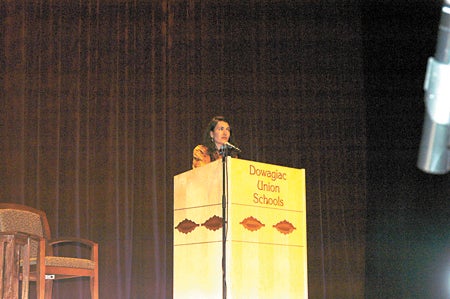Author flirts with failure to lose herself in discovery
Published 11:45 am Monday, May 13, 2013
Nicole Krauss writes to articulate questions urgent enough they could take years to answer. Losing herself in work, she learns about herself.
From disorientation comes discovery.
“I actually find it comforting to be very close to failure,” she said. “Then pieces begin to fall into place.”
Her novels evolved from a linear first try to polyphonic pages in multiple voices.
“It’s much easier to get lost with lots of balls in the air. I have no idea whether I’m going to catch them. We love metaphors because we take two disparate things and juxtapose them in a commonality that brings a sense of order to the world. Metaphors further our belief there is an underlying relationship between all things that we sense, even if we can’t name it or describe it,” Krauss said. “Within a novel you have the same effect. You begin to create echoes and illusions and patterns begin to emerge in an elegant way. That feels more authentic and natural and allows me greater complexity.”
Another Krauss connection is the capacity for self-reinvention.
Krauss, 38, led off the 22nd annual Dogwood Fine Arts Festival Friday night at Dowagiac Middle School Performing Arts Center.
“Everyone’s from someplace else” in her family — four European Jewish grandparents who left to start over; parents born in two different countries (her father, Tel Aviv, Israel, her mother, London); she was born in America.
“Home has always been elusive to me,” she said.
Writing and reading expand a person’s possibilities and build empathy and compassion. “You step into other people’s shoes,” she said, “and open yourselves to what it feels like to be another person. Literature does that powerfully.”
A poet (Joseph Brodsky mentored her at Stanford) before becoming a “lowly prose writer,” she felt the need to reinvent herself in each of her three books so she can take new risks with that urgency “to say something I haven’t said before,” but is cognizant of recurring themes.
In some way, she always studies how characters respond to catastrophic loss —memory (2002’s “Man Walks Into a Room,” finalist for the Los Angeles Times Book of the Year; Richard Gere optioned the movie rights), family (“The History of Love,” 2005, the favorite of Anastasia Dykins of Dowagiac, the Visiting Authors Committee member who introduced her); and Jerusalem (2010’s “Great House,” a finalist for the National Book Award; the New York Times hails her as “one of America’s most important novelists; The New Yorker lists her as one of “20 under 40” writers to watch.
Her husband since June 2004, Jonathan Safran Foer, visited Dowagiac in October 2007.
The Long Island native began constructing “Great House” in four voices without any “blueprint. Don’t try that at home. You’ll cry and tear your hair out. Every house always has something broken or a window sticks. Novels are imperfect like that, but it’s comforting and you can make yourself at home and live in it for a long time. You might start with a doorknob, build a room, a staircase and it begins to accumulate. My dad was a structural engineer. It must be in the blood.”
“The History of Love” is “filled with charming characters who wear their hearts on their sleeves.” In “Great House” she “wanted people who were more difficult and to meet them in the midst of their struggles. We read novels because they are windows into somebody else’s troubles and give us a sense of how we can transcend.”
It belatedly dawned on her the “ugly, overbearing” desk which originated in a short story and migrates from character to character in “Great House” is hers atop a “tall, narrow house” in Brooklyn. “I hate this desk. I inherited it, though not from a Chilean poet,” Daniel Varsky, a byproduct of her obsessive immersion in learning about those who disappeared during the Pinochet regime.
“When I had my first child,” a son now 7, “I was absolutely consumed with the idea that for the first time in my life, I had the terrifying responsibility for what was passed on to this child. It’s not a book about motherhood, but I’ll always look at this book as the only mechanism I could have invented to capture all of that feeling of being a parent. We think we have more influence than we do. They’d rather be their own people.”
“At the end of my life as a writer, and the struggle with writing is over, I’ll be happy to look back and think I didn’t write as many books as I could have because of the way I work, but I wrote the books that mattered to me.”
— Nicole Krauss in Dowagiac May 10
Nicole Krauss considers Q&As with her audience the “most important and wonderful part of the evening,” and she proved it in Dowagiac by devoting almost a half hour to the exchange after speaking about how she writes for 45 minutes, then reading from “Great House.”
Krauss brings half of a book through her words, which pose questions, counting on readers to raise their own queries for the remaining 50 percent.
“You fill in the rest with your imaginations, experiences and your sense of the fullness of life,” she said. “We meet and have a conversation. It’s an intimate relationship,” like “the old man from Miami” who offered to live another 10 years if she published every two years. With motherhood, “Great House” took longer.
She didn’t reveal whether her “Si Newhouse” was the 85-year-old chairman and CEO of Advance Publications, whose Conde Nast publishes Vogue, Vanity Fair and The New Yorker.
Patty Patano of the Cass County Council on Aging told Krauss, “Memory and loss are two of the most critical issues as people age. For being so young, it feels like you’re an old soul. I’m intrigued by the depth you bring.”
“I’m often asked the related question of how I can keep writing about so many old men,” Krauss replied. “Superman is Clark Kent, Beyonce has Sasha Fierce and I have old Jewish men. Maybe I’m drawn to that position of being old and having little time left. Being interested in memory or loss has more to do with my family. I remember reading ‘One Hundred Years of Solitude’ (by Gabriel Garcia Marquez, 1967) with my English class when I was 14. The teacher asked if we knew what the book was about. The whole class was mystified by ‘nostalgia.’ That (multi-generational) book blew my mind. I want to know what makes people the way they are. It takes a long time to get there, but that’s what fascinates me. So much of writing is discipline. At the end of my life as a writer, and the struggle with writing is over, I’ll be happy to look back and think I didn’t write as many books as I could have because of the way I work, but I wrote the books that mattered to me.”
“Being here tonight is a little bit surreal, having driven through cow pastures,” she said.
K&M Machine-Fabricating, Cassopolis, sponsored the author for the sixth consecutive year.







